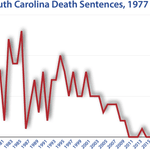
State & Federal
South Carolina

Timeline
1974 — South Carolina reinstates the death penalty following Furman v. Georgia.
2006 — South Carolina governor signs bill that allows prosecutors to seek the death penalty for repeat child abusers.
2011 — Hospira Inc., the sole U.S. manufacturer of sodium thiopental, announces that it will no longer manufacture the lethal injection drug. South Carolina opts to use pentobarbital, instead.
2012 — Edward Elmore is released from prison after nearly 30 years on death row. He agrees to a plea deal in which he maintains his innocence but agrees the state could re-try him for murder.
2012 — Joseph Ard is released from prison after 11 years on death row after new evidence was discovered that corroborates Mr. Ard’s claim that the shooting death of his pregnant girlfriend was accidental.
2014 — South Carolina vacates the conviction of George Stinney, Jr., the youngest person executed in the U.S. in the last century. At 14 years old, Mr. Stinney was convicted by an all-white jury, after deliberating for ten minutes, and sentenced to electrocution for the killing of two young white girls.
2016 — The death sentence of Johnny Bennett, a black defendant condemned by an all-white jury, is vacated due to prosecutor Myers’ racist remarks regarding Mr. Bennett’s interracial sexual relationship with a white woman. Mr. Myers referred to Mr. Bennett as a “monster,” “King Kong,” a “caveman,” and a “beast of burden” in his closing argument.
2021 — The South Carolina legislature authorizes the use of the electric chair and firing squad as the state reaches a decade without any execution.
2022 — South Carolina completes preparations to execute the state’s death row prisoners by firing squad.
2022 — Death row prisoners ask the South Carolina Supreme Court to defer setting execution dates until the courts resolve pending legal challenges to the state’s controversial execution methods — notably the state’s authorization of execution by firing squad.
2022 — The South Carolina Supreme Court halts two scheduled executions, including one that would have been the state’s first execution by firing squad, amid ongoing legal challenges by death row prisoners over the state’s execution methods.
2022 — A South Carolina trial court issues an injunction preventing the state from carrying out executions by firing squad or the electric chair, ruling that those methods violate the state’s constitutional prohibition against “cruel, unusual, and corporal punishments.”
2023 — South Carolina Supreme Court blocks the state’s efforts to conceal information regarding attempts to obtain lethal injection drugs.
2023 — A bill to conceal the identities of lethal injection drug suppliers and execution team members pass both chambers of the South Carolina legislature. Governor Henry McMaster signs the bill just a few months later. Gov. McMaster and South Carolina Department of Corrections issue a joint statement informing the public that the state has obtained lethal injection drugs and is ready to carry out executions.
Famous Cases
Brothers Thomas and Meek Griffin, as well as two other Black men, were convicted in the 1913 murder of a Confederate Civil War veteran. The Griffin brothers were convicted based on accusations from an individual found to be in possession of the victim’s weapon. He agreed to testify against the Griffin brothers in exchange for life in prison. The Griffin brothers and their codefendants were arrested, tried, and sentenced to death within days of the crime, leaving their defense attorneys with an inadequate opportunity to prepare for trial. All men were sentenced to death and appealed their convictions to the state Supreme Court, which ultimately denied their claims. More than 100 people from Chester County, South Carolina petitioned then-Governor Richard Manning to commute the Griffins’ sentences, but they were executed in September 1915. Both Thomas and Meeks Griffin were granted posthumous pardons in October 2009 after Tom Joyner sought out the pardons of his great-uncles.
14-year-old George Stinney and his younger sister, Aime, were playing outside when two white girls approached them, asking where they could find a particular flower. Neither Mr. Stinney nor his sister knew where the young girls could find these flowers and they quickly moved along. That evening, when both young girls failed to return home, a search party was sent to find them. Mr. Stinney and his family joined the search party, and he mentioned to another searcher that he had seen the girls earlier in the day; he was later arrested and charged with their murders. According to police, Mr. Stinney confessed to bludgeoning both girls to death despite the absence of any physical evidence connecting him to the crime. Mr. Stinney was charged with capital murder and rape, tried, convicted, and executed in South Carolina’s electric chair in just under three months, on June 16, 1944.
In October 2013, attorneys for the Stinney family filed a petition asking the court to overturn the guilty verdict. Just three months later, Sumter County Circuit Judge Carmen Mullen held a two-day evidentiary hearing to determine whether Mr. Stinney received a fair trial. In December 2014, Judge Mullen formally vacated Mr. Stinney’s capital conviction, determining that he was deprived of due process throughout his trial.
Serial killer Donald Henry “Pee Wee” Gaskins, Jr., who grew up in an extremely violent household, attempted his first murder at the age of 13. He claimed to have killed many other people, but law enforcement authorities could not verify all those claims. In his autobiography, Gaskins said he had “a special mind” that gave him “permission to kill.” (Wikipedia). He was executed in the electric chair in 1991.
Susan Smith was convicted of murdering her two young sons by restraining them in their car seats and driving the car into a lake. She initially claimed that two African-American men had kidnapped her sons, but soon admitted to their murder. She was represented by prominent death penalty attorneys, who brought out facts about abuse she had suffered from her stepfather. Although the state asked for the death penalty, jurors returned a verdict of life in prison with the possibility of parole.
Notable Exonerations
Michael Linder was sentenced to death in 1975 for killing a highway patrol officer. He was later found to have killed the officer in self defense and was acquitted in 1981.
Warren Douglas Manning was convicted in 1989 of murdering a police officer. The conviction relied entirely on circumstantial evidence, and Manning was acquitted in 1999.
Milestones in Abolition/Reinstatement
Herbert Fielding introduced a bill to abolish the death penalty during every legislative session he spent in the South Carolina legislature. None of the bills passed either chamber, but during his tenure (1970 – 1973 and 1983 – 1992) the bills kept the issue alive in the minds of South Carolina legislators.
Throughout the 1990s and early 2000s, bills to expand the use of the death penalty were introduced during nearly every legislative session, but were not passed. In 2021, after the state reached ten years without an execution because of the Department of Corrections’ inability to obtain lethal injection drugs, the state legislature passed a bill to allow executions by electric chair or firing squad, making the electric chair the default method of execution.
South Carolina Executions in the 20th Century (by Offense and Race)
Historical data on executions in South Carolina reflects the state’s centuries-long discriminatory application of the death penalty against African Americans. Black men, women, and children comprised 78.5% of the people executed in South Carolina in the 20th century. Three-quarters of those executed for murder in the 20th century were people of color, and 74.5% were Black.
When it came to offenses in which no one died, the link between executions and lynchings in South Carolina is undeniable. Black men accused of sexual indiscretions with white women were frequent victims of lynching. For most of the 20th century, South Carolina permitted the death penalty for rape and attempted rape but employed it almost exclusively against Black men. 92.4% of those executed for rape or attempted rape were Black. 87.8% of those executed for rape were Black, and only Black men or boys were executed for attempted rape.
| Decade | Total Executions | Murder | Rape | Attempted Rape | ||||||||
| W | B | All | W | B | All | W | B | All | W | B | All | |
| 1900 – 1909 | 4 | 26 | 30 | 4 | 21 | 25 | 0 | 5 | 5 | 0 | 0 | 0 |
| 1910 – 1919 | 3 | 49 | 52 | 3 | 31 | 34 | 0 | 5 | 5 | 0 | 13 | 13 |
| 1920 – 1929 | 8 | 28 | 36 | 8 | 23 | 31 | 0 | 3 | 3 | 0 | 2 | 2 |
| 1930 – 1939 | 18 | 50 | 68 | 18 | 44 | 62 | 0 | 5 | 5 | 0 | 1 | 1 |
| 1940 – 1949 | 9 | 50 | 59 | 5* | 30 | 35 | 4 | 12 | 16 | 0 | 8 | 8 |
| 1950 – 1959 | 5 | 20 | 25 | 5 | 16 | 21 | 0 | 4 | 4 | 0 | 0 | 0 |
| 1960 – 1969 | 3 | 5 | 8 | 2 | 2 | 4 | 1 | 2 | 3 | 0 | 1 | 1 |
| 1970 – 1979 | 0 | 0 | 0 | 0 | 0 | 0 | 0 | 0 | 0 | 0 | 0 | 0 |
| 1980 – 1989 | 2 | 0 | 2 | 2 | 0 | 2 | 0 | 0 | 0 | 0 | 0 | 0 |
| 1990 – 1999 | 13 | 9 | 22 | 12 | 9 | 22^ | 0 | 0 | 0 | 0 | 0 | 0 |
| Total | 65 | 237 | 302 | 55 | 176 | 236 | 5 | 36 | 41 | 0 | 25 | 25 |
* Includes 2 white men and 1 white woman who were executed in 1943 for conspiracy to commit murder.
^Includes 1 Native American man who was executed in 1999.
Sources: For executions between 1900 and 1972 — Executions in the U.S. 1608 – 2002: The ESPY File, Executions by State. For executions between 1972 and 1999 — Death Penalty Information Center, Execution Database.
Resources

South Carolina Execution Totals Since 1976
News & Developments
News
Sep 04, 2025
Juror Trauma: The Added Cost of Capital Cases
When Chloe Beck was called for jury duty in early 2018, she initially viewed it as a potential break from work. But she did not anticipate that the case — involving a nanny charged with the stabbing deaths of two children — would have lasting effects on her mental health. As an alternate juror in the seven-week trial, Ms. Beck was required to look at crime scene photographs and hear testimony from the victims’ parents. For Ms. Beck, the experience proved difficult to…
Read MoreNews
Jul 22, 2025
Texas Pilot Program Allows for Less Restrictive Conditions for Some on Death Row for First Time in Decades
Recent reporting from the Houston Chronicle describes a pilot program begun in February of last year which has allowed a select group of prisoners on Texas’ death row the opportunity to experience loosened confinement conditions. About a dozen individuals on Texas’ death row are being allowed to mingle in a common room, share meals, and spend time outside of their cells without handcuffs or shackles. As the Chronicle reports,“instead of shouting to each…
Read MoreNews
Jun 04, 2025
2025 Roundup of Death Penalty Related Legislation
More than one hundred bills have been introduced this year in 34 states and in Congress to expand and limit use of the death penalty, abolish and reinstate the death penalty, modify execution protocols and secret the information about them, and alter aspects of capital trials. Thus far, nine bills in five states have been enacted, with Florida enacting the most legislation. Of the bills that have been signed into law, three modify execution protocols; two expand…
Read MoreNews
May 13, 2025
Lawyers Raise Concern as Autopsy Finds South Carolina’s Second Firing Squad Execution May Have Been Botched
On May 8, 2025, Mikal Deen Mahdi’s lawyers submitted to the South Carolina Supreme Court the state pathology report in his case which suggests that Mr. Mahdi’s execution last month by firing squad did not go as planned. Pathologists reported that not only did Mr. Mahdi have two wounds as opposed to the anticipated three wounds from three South Carolina Corrections Department (SCDC) shooters, but also that they missed the intended target over his heart, prolonging his…
Read MoreNews
Mar 31, 2025
Articles of Interest: Adverse Childhood Experiences, Their Effects on Mental Health, and the Connection to Legal System Involvement
This month marks the 20th anniversary of the landmark U.S. Supreme Court decision in Roper v. Simmons. In a series of posts anticipating the April 2025 release of DPI’s report commemorating the 20th Anniversary of the Roper decision and its implications for emerging adults , we are exploring scientific and legal developments related to juveniles and emerging adults in the death penalty system. Adverse childhood experiences (ACEs) refer to potentially…
Read More

